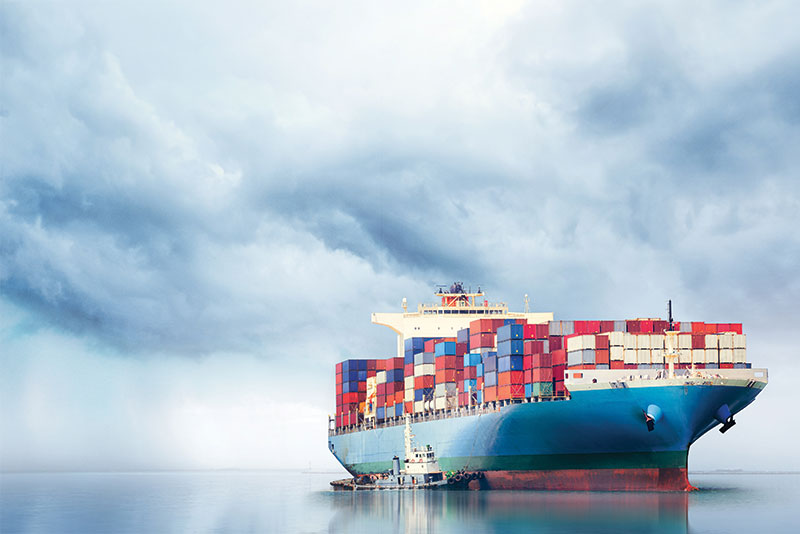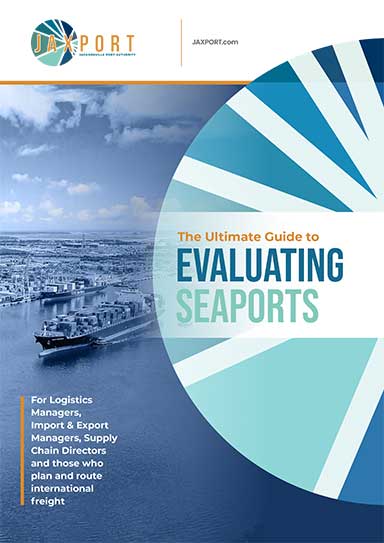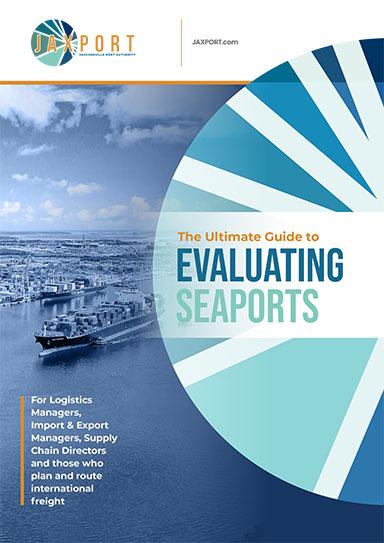Group of ocean container shipping leaders ring the bell for sector decarbonization
Late last week, at the COP28 conference in Dubai, leadership for some of the largest global container shipping lines banded together to issue a joint declaration for an end date for newly-built fossil fuel-powered vessels, while also calling on the International Maritime Organization (IMO) to establish regulatory conditions needed to move on to green fuels to power vessels.
The container shipping lines’ CEOs collaborating on this initiative include: Vincent Clerc, CEO, A.P. Moller-Maersk; Rodolphe Saadé, Chairman and CEO of the CMA CGM Group; Rolf Habben Jansen, CEO of Hapag-Lloyd; Soren Toft, CEO of MSC Mediterranean Shipping Company; and Lasse Kristoffersen, President and CEO, Wallenius Wilhelmsen.
The driver for this collaboration, according to the executives, stems from how “global temperatures are breaching critical levels, creating more frequent and devastating results,” increasing the onus on the container shipping sector, which accounts for 2%-to-3% of global greenhouse gas (GHG) emissions to meet the IMO’s 2030, 2040, and net-zero GHG targets. And the CEOs noted that collaboration with IMO regulators is needed in order to “produce the effective and concrete policy measures needed to underpin the investment within maritime shipping and its ancillary industries that will enable decarbonization at the pace required.”
The CEOs are calling for what they termed regulatory cornerstones in the joint declaration, including:
- an end date for new building of fossil fuel-only vessels and a clear GHG Intensity Standard timeline to inspire investment confidence, both for new ships and the fuel supply infrastructure needed to accelerate the energy transition;
- an effective GHG pricing mechanism to make green fuel competitive with black fuel during the transition phase when both are used. This can be done by distributing the premium for the green fuels across all the fossil fuel used. With low initial volumes of green fuels any inflationary effects are minimized. The mechanism must also feature an increasing regulatory incentive to achieve deeper emissions reductions. Furthermore, beyond covering the ‘green balance fee’, revenue generated by the mechanism should go to an RD&D fund and to investments in developing countries to ensure a just transition that leaves no one behind;
- a vessel pooling option for GHG regulatory compliance where the performance of a group of vessels could count instead of only that of individual ships, ensuring investments are made where they achieve the greatest GHG reduction and thereby accelerating decarbonization across the global fleet; and
- a Well-to-Wake or lifecycle GHG regulatory basis to align investment decisions with climate interests and mitigate the risk of stranded assets
“At Wallenius Wilhelmsen we have decided to be a shaper of the journey to net-zero and focus our investments in supporting this ambition,” said Kristoffersen in a statement. “Our customers want to partner with us on the voyage. Now, we need a global regulatory framework matching this ambition to drive the investments needed at a global scale.”
Sarah Banks, managing director and global freight and logistics lead at Accenture, said that this announcement from shipping line leaders to decarbonize ocean transport faster is a significant move.
“Our research shows shipping is part of the industry that is key to break the current decarbonization stalemate,” said Banks. “The declaration addresses the right regulatory cornerstones. Particularly, a GHG pricing mechanism underpinned by appropriate regulatory incentives is a must-do component to meet decarbonization targets. I believe the initiative is likely to gain further support and commitment across various shipping modes and with shippers who have been waiting for an announcement like this to help move the needle.”
And Brooks Bentz, supply chain consultant and LM contributor called the joint declaration a noble effort to meet this issue head on.
“For those living in a cave that still deny climate change is occurring, this won’t mean much. And it’s really too bad that for many, climate change has become a political rather than a scientific matter,” he said. “For those of us who are seeking to take steps to help mitigate whatever our contribution to global warming is, this is a good step. Bear in mind, ocean carriers account for 3.5%-4.0% of all greenhouse gas emissions, so while this is a big step for a major industry, it’s only part of the solution. I think there is a segment of the population that thinks if we can’t fix it all, why try? Instead, this is going to be an iterative process that will take quite a long time…maybe even more time than we actually have to cure it, but we have to do our utmost to try.”
Kevin Smith, President and CEO of Sustainable Supply Chain Consulting and CSCMP Chairman of the Board, explained that setting a sunset for building and commissioning new fossil fuel powered ships is a good idea albeit one with no specifics suggested.
“It would be absolutely wrong to simply and quickly outlaw fossil fuel ships,” said Smith. “Ships take a long time to build and the existing infrastructure (and capacity) must be maintained in order to support existing supply chains. The so-called ‘green fuels’ remain unnamed. The most distressing information for shippers is that they apparently intend to offset any increased cost of green fuels by adding surcharges to shippers using fossil fuels. Of course, they say it in a nicer way: ‘distribute premiums for green fuels across fossil users.’
What’s more, Smith explained that the CEOs remarked that since green fuels are negligible presently, that the inflationary effect would be small, leaving the question of what happens when the push to increase green fuels starts to rise?
“There will be a protracted period of time when fossil users will be paying premiums for the R&D of fuel they are not using,” he said. “Then the inflationary effect will be greater. It will mean higher prices for shippers and consumers. According to the stated timelines, this will be in effect for the next 16-to-26 years when the quoted carriers expect to get to net-zero GHG emissions. Who knows what the price will be for the green fuels (yet to be named)?”
While it would be good to limit or eliminate GHG emissions, Smith observed that in the end good intentions will likely be trumped by pricing advantages.
“They need to find a way to neutralize the adverse pricing effect of green fuels to make this initiative truly attractive to shippers,” he said. “And, by the way, 2040 and 2050 will be here before we know it. Someone better identify the target green fuels pretty soon, or this will not happen.”
Philip Damas, director and head of the supply chain advisors practice at London-based Drewry, explained that this initiative shows that the shipping companies are getting more organized and are aware that decarbonization is a tough issue, which they need to address together, adding that this is an extension of a similar joint statement made by Maersk and CMA CGM in September.
“There are now four of the top five container shipping companies between this joint policy initiative and lobbying—instead of just two in September. This should be welcome by the industry,” he said. “I find it interesting that the shipping companies are calling on governments to introduce clearer, more specific mandatory regulations to ban the construction of new fossil-fuel vessels and to introduce more carbon taxes—presumably in an effort to narrow the huge gap between fossil fuel and green fuel. At Drewry, we have said for some time that shipping—a commoditized industry for which buyers usually go after the lowest costs—cannot be decarbonized if green fuel costs much more than fossil fuel, unless policy measures are introduced either to raise the price of fossil fuel or to restrict the use of fossil fuel. Such a big financial and environmental change for shipping cannot be a voluntary endeavor by the private sector (shipping companies and exporters/importers) alone; it requires regulators to level the playing field.”













